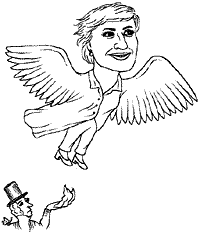
Tina!
The Tina Brown Years (1992-1998). Brownian buzz surrounds the editor's move from The New Yorker to Miramax. The assessments of her career: 1) She modernized Mr. Shawn's dinosaur of a magazine, adding photos and topical stories. 2) She reshaped the magazine "in her own image--brainy, Anglophilic, profane and more than a little starstruck" (Richard Lacayo, Time). 3) She succeeded in her true goal: making herself the center of attention. 4) The magazine's middlebrow tendencies triumphed under her leadership. 5) She made a gutsy midcareer change. 6) Her new venture with Disney-owned Miramax is the Mouse's latest step toward total cultural domination. 7) She will be a victim of synergy, reduced to "scrounging around for tony material to turn into tacky movies" (Maureen Dowd, the New York Times). (For more on Tina, see David Plotz's "Assessment" of her in Slate.)
Art
"Unknown Terrain: The Landscapes of Andrew Wyeth" (Whitney Museum of American Art, New York City). The Whitney attempts to redeem the Realist painter from his reputation as a vapid schlockmeister, deeming him a precursor to Abstract Expressionism. But critics hate him as much as ever: "His art is not just premodern; it's stone dead" (Calvin Tomkins, The New Yorker). The New York Times' Roberta Smith avers: "Mr. Wyeth is quoted as saying, 'I'm not very nice.' For all its restraint, this exhibition bears him out." Critics can't understand why curators chose to exclude Wyeth's best paintings (his Helga and Christina series). And they accuse the Whitney of pandering to tourists' bad taste to garner huge crowds. (For the lowdown on the show, click here.)

Movies
Small Soldiers (DreamWorks SKG). Because of its unexpectedly gratuitous violence and grotesqueries, critics lay into this "merchandising tie-in in search of a movie" (David Ansen, Newsweek). Its seemingly harmless plot: An avaricious toy manufacturer places vivifying microchips into action figures. Director Joe Dante is chided for wasting realistic special effects and the voices of Tommy Lee Jones and Ernest Borgnine and for failing to reprise the biting humor of his magnum opus, Gremlins. Critics dwell on the irony of the late Phil Hartman's character getting caught in crossfire. (The synergistic official site is available here.)
Lethal Weapon 4 (Warner Bros.). The 11-year-old action franchise "begs for a mercy killing" (Joe Morgenstern, the Wall Street Journal). Many critics even wax nostalgic for the psychological acumen of earlier Lethal Weapon installments. They regret that the once-complicated Danny Glover-Mel Gibson relationship has been reduced to shtick and car chases. Critics occupy themselves with explaining the film's popular appeal: "[I]t's not a good movie, but things blow up really good in it" (Andy Seiler, USA Today). (Click here for the official site.)
Buffalo 66 (Lions Gate Films). Critics either tout or trash this farce by ex-Calvin Klein model Vincent Gallo--the movie's star, writer, director, and composer. Some see Gallo as the heir to Scorsese and the '70s neorealists, with the "audacity and flair of a major filmmaker" (Owen Gleiberman, Entertainment Weekly). They applaud his stylistic flourishes (collage shots, freeze frames), his self-deprecating humor, and audacious premise--a newly released prisoner kidnaps a teen tap dancer (Christina Ricci) to be his fake wife. Others find that Gallo overdoes the artsy stuff. It is what "it would be like reading papers for a freshman creative writing course" (Jack Mathews, Newsday).
Music
Embrya, by Maxwell (Columbia). A second chart topper from "pop's reigning lover man" (Richard Harrington, the Washington Post). Critics remain undecided about Maxwell's virtues. Some like his silky falsetto voice and praise him for reviving the '70s soul music of Marvin Gaye and Teddy Pendergrass. Others attack his pretensions to being a Sensitive New Age Guy, and they damn him with the faint praise that he makes good late-night mood music. (For Maxwell's lyrics, click here.)
Car Wheels on a Gravel Road, by Lucinda Williams (Mercury). High praise for the latest effort from the 44-year-old Southern roots singer, dubbed "album of the year" by Spin. Her charms: a craggy voice and unsentimental (sometimes gothic, sometimes macho) lyrics, refreshing in a world inundated by "cookie-cutter Lilith-ready wimps" (David Browne, Entertainment Weekly). Critics predict that Williams will finally emerge from her long sojourn as a cult star to become a genuine pop star. (Mercury plugs the album here.)
Recent "Summary Judgment" columns
Movie--Armaggedon;
Movie--Henry Fool;
Death--Roy Rogers;
Book--Explaining Hitler: The Search for the Origins of His Evil, by Ron Rosenbaum;
Book--Someone Else's House: America's Unfinished Struggle for Integration, by Tamar Jacoby;
Book--Bridget Jones's Diary, by Helen Fielding;
Performance Art--The Return of the Chocolate Smeared Woman, Karen Finley.
Movie--Out of Sight;
Movie--SmokeSignals:
Movie--Dr. Dolittle;
Movie--Gone With the Wind;
Art--"Bonnard;"
Book--Suits Me: The Double Life of Billy Tipton, by Dianne Wood Middlebrook;
Book--The Notebooks of Don Rigoberto, by Mario Vargas Llosa, translated by Edith Grossman.
Movie--The X Files;
Movie--100 Years, 100 Movies (AFI);
Movie--Mulan;
Art--"Charles Ray;"
Book--Walking With the Wind: A Memoir of the Movement, by John Lewis, with Michael D'Orso;
Book--Ship of Gold: In the Deep Blue Sea, by Gary Kinder;
Book--A Beautiful Mind, by Sylvia Nasar.
Movie--Six Days, Seven Nights;
Movie--The Opposite of Sex;
Movie--High Art;
Theater--Not About Nightingales;
Television--The Magic Hour;
Book--Gain, by Richard Powers.
--Franklin Foer
